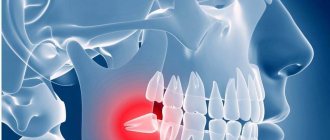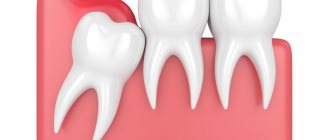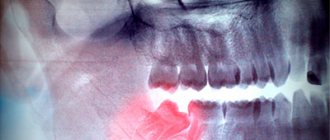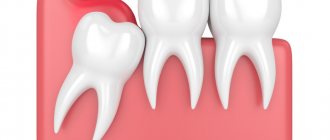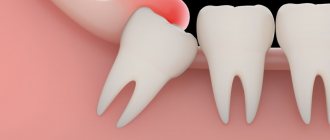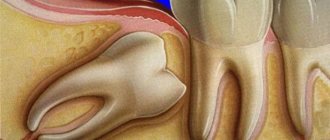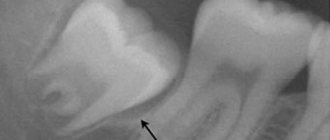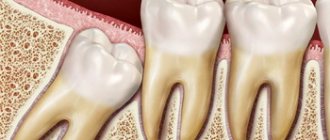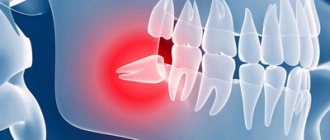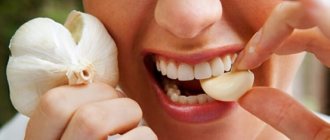A wisdom tooth is the third molar, which appears later than the others, and sometimes does not erupt at all. A person cannot have more than 4 wisdom teeth. The approximate time when teething begins is 18 - 27 years.
Modern experts classify wisdom teeth as rudiments - elements that, in the course of evolution, have lost their role for humans. The specific location of third molars causes a number of difficulties in terms of caring for them.
“Eights” are not loaded like other teeth. In addition, they almost always tend to erupt painfully. It is not surprising that they are called the most problematic, and most dentists recommend removing wisdom teeth at the first opportunity.
Causes of inflammation
Inflammation of the gums near the eighth tooth is accompanied by pain and discomfort. To diagnose the disease, it is necessary to take an X-ray of the tooth and take a blood test. Based on the results of the studies, the doctor makes a decision:
- Remove the tooth.
- Prescribe therapeutic treatment.
- Or cut the gum.
The gums can become inflamed and painful, most often due to the incorrect position of the tooth, which has difficulty erupting and grows in the wrong direction relative to the dental arch. The number eight can take a very long time to erupt, up to several years.
Is it possible to remove a wisdom tooth during pregnancy?
Wisdom tooth removal is carried out only in difficult cases, when it is important to prevent pregnancy complications, eliminate the source of infection, and quickly prevent complications and symptoms. It is not recommended to remove wisdom teeth when it is possible to do without surgery. It is planned to remove a wisdom tooth if the following factors are present:
- Unbearable pain that does not subside even when taking safe painkillers;
- Inflammation rapidly develops in the gums, causing complications;
- A cyst or granuloma has formed at the apex of the incisor;
- Pus is released.
The operation to remove wisdom teeth is performed under local anesthetics, which are approved for pregnant patients. Of the anesthetics, only those drugs that do not penetrate the placenta are used. The dosage is calculated depending on the patient’s age, her general condition and the duration of pregnancy. Wisdom tooth extraction is planned up to 13 weeks and from 14 to 25 weeks. Dental treatment cannot be performed at any other time. Read more about this in the article Dental treatment during pregnancy. Take care of yourself, because the baby’s health depends on the general condition of the mother! Make an appointment with a dentist to find out the condition of your teeth and prevent complications in time.
Reasons for taking so long for teeth to erupt
- The wisdom tooth is very large and there is no room for it.
- Dense bone tissue makes tooth eruption difficult.
- Due to crowding, the tooth does not occupy a natural position: it grows at an angle or parallel to the gum.
Pericoronitis
If the wisdom tooth is slowly erupting, a gum hood may appear over it. This hood prevents the tooth from growing and is a favorable place for food debris and saliva to accumulate. Pathogenic microbes can begin to multiply on this fertile soil.
At the initial stage of development of pericoronitis, it can be stopped with antibacterial drugs. If the disease has developed into a purulent stage, and the patient shows all the signs of infection of the whole body, then the doctor performs a small operation - he cuts the gum and cleans out the pus, thereby helping the tooth to erupt.
Caries
If carious cavities appear on the figure eight, the gums may become inflamed and the tooth will begin to ache. In addition to caries, wisdom teeth are characterized by diseases such as pulpitis and periodontitis. These diseases can be detected by visual examination of the tooth or by x-ray. Treatment depends on the number of cavities and the condition of the paired molar on the opposite jaw.
Other causes of gum inflammation figure eight
- The gums can become inflamed from mechanical trauma or after a burn to the gum tissue.
- With hormonal changes in the body in pregnant women or during menopause.
- For thyroid disease.
- from removable dentures.
- For diseases of the throat and genitourinary system.
- When using hormonal drugs.
Wisdom tooth hurts. What to do?
According to statistics, it is wisdom teeth that most often cause problems. Erupted “eights” are quickly affected by caries, and sometimes even remain in the bone tissue and in most cases cause discomfort. So what to do with a wisdom tooth when it hurts, haunting you day and night? Is it worth keeping the “eight”, or is it better to delete it?
What is known about wisdom teeth?
They got their name because they begin to erupt between the ages of 18 and 30. Scientists consider them to be a vestigial organ that does not bear any functional load when chewing food.
Typically, discomfort is caused by recumbent “eights”, which grow horizontally in the jaw. They don't have enough space to erupt and put pressure on neighboring teeth. As a result, the entire dentition shifts. Moreover, recumbent “eights” severely injure the gums, which leads to chronic inflammation.
Signs of wisdom teeth erupting
- Pain in the jaw, radiating to the ears and temples
- Inflammation, swelling and itching of the gums behind the last tooth
- Enlarged lymph nodes
- Temperature increase
- Painful swallowing
- Persistent runny nose
- Difficulty opening your mouth
What are wisdom teeth?
For “eights” that have difficulties with eruption, there are special terms in dentistry - “dystopic” and “retained”.
Dystopic teeth are those that grow incorrectly due to lack of space in the jaw. Usually they are shifted towards the tongue, cheeks or located at an angle. Impacted teeth are unerupted teeth that remain completely in the bone.
Why do wisdom teeth hurt and gums become inflamed?
- Dystopia . Due to the incorrect position during teething, the soft tissues of the cheek are injured, and bite deformities appear.
- Retention . Late eruption affects the general well-being of the patient.
- Pericoronitis . Inflammation of the gums occurs when the “eight” erupts. Soreness, swelling and redness appear.
- Caries . It is quite difficult to qualitatively remove plaque from the surface of a wisdom tooth, since the “figure eight” is located far away. As a result, caries occurs.
What to do if an erupted wisdom tooth hurts?
Most often, a wisdom tooth hurts due to the fact that it has to erupt in cramped conditions - its “neighbors” have already taken their place, leaving it a minimum of space. One should also take into account the fact that in an adult, the volume of jaw bone tissue decreases over the years, which complicates the eruption of the last molars. Sometimes they can be affected by caries, which is complicated by pulpitis and periodontitis.
As can be seen from the above, a wisdom tooth can hurt for various reasons - from physiological to pathological. If it begins to bother you, you should immediately consult a dentist - the doctor will find out what caused the pain and give recommendations. Even if treatment is required, it will be carried out early, which will eliminate further complications.
What to do: treat or remove wisdom teeth
When the “eight” causes severe discomfort, you need to consult a specialist. After the examination, he will conduct a diagnosis. Dental treatment is possible only if there are no caries complications. Pulpitis and periodontitis will definitely require removal. Our doctors will take care of your comfort and perform the operation painlessly.
Stages of wisdom tooth removal
- Diagnostics . A panoramic photo of your jaw reveals comprehensive information about the location of the figure eight.
- Pain relief . Local anesthesia is performed, after which you will not feel the surgeon’s manipulations.
- Removal . The doctor carefully extracts the tooth and treats the hole with an antiseptic.
Recommendations after wisdom tooth removal
Recovery will be faster if you listen to the recommendations of a specialist. You should not eat during the first 2–3 hours. Try to refrain from smoking, alcohol, spicy and hot foods, physical activity and hot water procedures, such as baths or saunas. Brush your teeth carefully without touching the socket. If necessary, take medications prescribed by your doctor.
If you have problems with your wisdom tooth, you should not self-medicate. It’s better to immediately contact ActiveDent dentistry, where you will receive qualified assistance.
Symptoms of wisdom tooth inflammation
To prevent a problem, you need to immediately notice the symptoms that cause it. To do this, special attention should be paid to the following points:
- there is a prolonged tugging pain;
- the gums become hard;
- the adjacent tooth becomes loose;
- body temperature rises;
- lymph nodes enlarge.
To alleviate his condition, the patient can take an analgin or paracetamol tablet at home before visiting a doctor, rinse his mouth with an antiseptic, and use only liquid food for nutrition.
If the pain is severe, you can take a painkiller pill, but you cannot suppress the pain with pills for a long time. You still need to go to the dentist.
First aid for a pregnant woman with growing wisdom teeth
When a wisdom tooth grows during pregnancy, the pregnant woman feels discomfort and irritation. Her condition is worsening due to pain that cannot be relieved with simple painkillers, because not all medications can be taken. What to do in this case? A pregnant woman can independently examine her wisdom tooth for swelling and inflammation of the gums. If such symptoms are not observed, then you can lightly massage the tooth in a circle from the outside. Another way to relieve pain is to bite hard food. But this must be done carefully. Often, as a wisdom tooth grows, a gum pocket opens. Residues of food can accumulate in it, which will subsequently bring even greater problems and pain. You need to consult a dentist to choose the right pain reliever that will help relieve pain and eliminate possible harm to the fetus. It will not be possible to completely relieve the pain syndrome, but it can be significantly reduced. You should not ignore visiting the dentist: complications may arise, which are problematic and more expensive to treat during pregnancy. This is one of the reasons why a timely visit to the dentist for a pregnant woman is mandatory.
Indications for removal
Wisdom teeth removal is carried out if the following indications are present:
- Horizontal growth of the molar (promotes displacement of teeth in a row);
- the figure eight occupies an anatomically incorrect position and harms neighboring units;
- incomplete eruption (impacted tooth);
- pulpitis, periodontitis;
- impossibility or inappropriateness of endodontic treatment.
If the wisdom tooth on top hurts, it is easier to remove it than the lower third molar. The lower eights are distinguished by large, developed, often tangled roots, and the mandibular bone itself has a more dense structure. The complexity of surgical extraction depends on:
- Wisdom tooth positions;
- the position of neighboring units that complicate extraction;
- degree of eruption;
- the number of roots, their confusion.
An orthopantomogram gives the doctor the necessary information about the position of the figure eight and its condition.
Content:
- Why does the gum around the wisdom tooth hurt? 1.1. Pain due to wisdom tooth cutting 1.2. Pericoronitis as a cause of pain 1.3. Dental neck caries 1.4. Other reasons
- Signs of inflammation
- What to do at home
- Treatment
- How to avoid inflammation
If your gums near your wisdom tooth hurt, you need to visit a dentist and undergo a prescribed examination. Self-medication for painful symptoms is usually ineffective, since it is not possible to establish the true cause of the disorder. Consequently, all measures taken will be aimed exclusively at relieving the unpleasant symptom.
